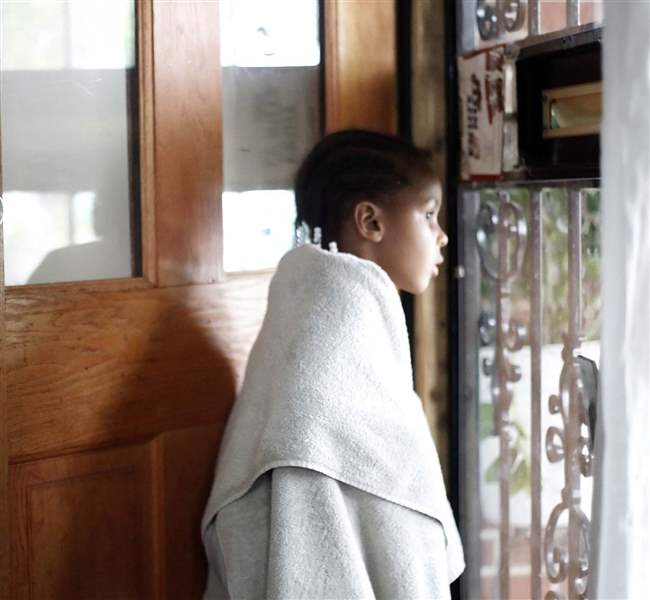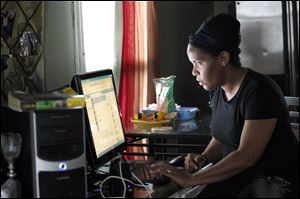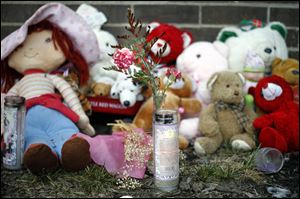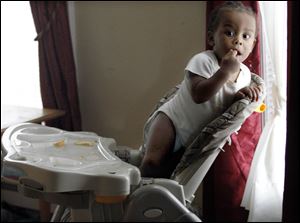
Effects vary, but violence's impact on children is deep, local experts say
8/28/2012
Barack James, looks out the door of his Platt Street home where he witnessed his brother Lawrence James, 19, being shot 5 times by home intruders.
The Blade/Amy E. Voigt
Buy This Image

Barack James, looks out the door of his Platt Street home where he witnessed his brother Lawrence James, 19, being shot 5 times by home intruders.
Barack James likes to draw pictures of dinosaurs and monsters.
When thunder clapped during a recent afternoon storm, he explained that a giant was walking around in the sky.
Barack seems to be a normal 3-year-old.
But less than a year ago, he was sitting in the living room of his family's Platt Street home in East Toledo -- with his mother, Twila Owens, and his older brother Lawrence James, 19 -- when five men burst through the front door.
After taking cash from the home, one of the men turned and started shooting -- Mr. James caught five bullets as he fell in front of his mother and brother. He survived.
Barack knows what happened. He saw the whole thing.
Any time a new visitor comes to the house, he shows him or her the notch in the hardwood floor from a ricochetted bullet.
"They shot Baby Bug," he says. "It went boom, boom, boom, boom, boom."
Ms. Owens said telling the story "is his way of warning people to stay away." There are still no arrests in the case.

Twila Owens, right, and her son Barack James, left, look at pictures of gang members on Facebook at their Platt Street home where her son Lawrence James, 19, was shot 5 times by home intruders.
"I'm not surprised to hear you say this little boy wants to tell the story to anyone in the house," said Carolyn Tompsett, an assistant psychology professor at Bowling Green State University. "One way kids try to make sense of things is to tell the story over and over, and tell it the way it makes sense to them. He needs to find a way for it to make sense."
Days after Keondra Hooks, 1, was shot in the head during a hail of gunfire as she and her sister, Leondra, 2, slept inside a Moody Manor apartment, her neighbor Antonio Johnson, Jr., was reliving that moment.
"She got shot in the head and died," he said before he took off running.
Antonio, who is 5, wasn't in the apartment when the girls were shot -- Leondra was struck in the chest and survived; Keondra died at Mercy St. Vincent Medical Center -- but may have heard the gunfire and certainly experienced the aftermath with media attention, prayer vigils, and an increased police presence.
Differing impacts
The extra attention to the neighborhood and visual reminders of the tragedy -- such as the still-boarded up door and a memorial of stuffed animals outside the apartment -- can affect children differently.
"Most parents don't -- I would assume -- talk to their children enough and check in enough about these kinds of things to see how they're feeling, but it's better to say, 'You know what happened at Moody Manor, what are you feeling? What do you think about the teddy bears being out there? How do you feel about them being there?' " said Adrienne Elhai, director of the Cullen Center at the Toledo Hospital campus.

A memorial is still on the stoop of the apartment in Moody Manor where Keondra, 1, and Leondra Hooks, 2, were shot as they slept in their great-grandmother's house. Keondra did not survive.
In urban areas such as Toledo, children who live in high-crime neighborhoods are likely to witness, experience, or even become victims of violence more than once. The repeated exposure to shootings, stabbings, and assaults can have a damaging impact -- behaviorally, mentally, and developmentally.
Trauma, Ms. Elhai said, affects brain development and even can cause a child to regress, citing as an example a child who is toilet trained but reverts to wearing diapers or bed wetting after experiencing trauma.
The younger the child, the more likely he or she is to become depressed or anxious and suffer from post-traumatic stress disorder, Ms. Tompsett said.
"Parents think kids don't understand because they didn't really see it or hear it. … They hear about it as much as teens might and they will get scared," Ms. Tompsett said.
A widely cited 1993 study conducted by the National Institute of Mental Health's Community Violence Project found at least 30 percent of children are victims of community violence and more than 90 percent witnessed violence at least once during their childhoods.
"Kids who grow up in neighborhoods like that, and are exposed to violence over and over again … are associated with them becoming more aggressive themselves," Ms. Tompsett said.
Lingering influence
The frequent exposure might make children more likely to become perpetrators of violence or, if they're exposed to gang activity, might make them more likely to join a gang, said Dean Sparks, director of Lucas County Children Services.

Eli James, 1, peeks out the window from his high chair in his Platt Street home. He was just an infant when older brother Lawrence James, 19, was shot by home intruders.
"I will say that, seeing violence in gangs or whatever in some of these communities, you would think that would say to kids, 'Gosh, I don't want to be involved in a gang. I don't want to be a part of that,' " Mr. Sparks said. "It almost seems like it encourages kids to be a part of that because, perhaps, 'If I join the gang, they will protect me.' "
Ms. Tompsett said it is important to note that "a lot of really good kids come out of those neighborhoods, and I don't know how they do it."
Although psychologists generally say children start to recall memories at about 3 years old, if there is a significant trauma, it could still have a serious impact on that child.
Last September, a 2-year-old boy was left in a central-city home for about 12 hours with the bodies of his parents, Andrew Baker and Tanja Cathey, who'd been shot and killed.
"Seeing a parent murdered, for example, even if it's the only violent event, could have a long-term impact," said Eric Dubow, psychology professor at Bowling Green State University. "That's taking away a child's support system."
Role of parents
The role of a parent or guardian is critical in helping children deal with the trauma, Ms. Elhai said.
"The parents I've met, the ones who are good at it … are the ones who can really talk to children," Ms. Elhai said. " 'This is what we're going to do to stay safe when they're shooting.' "
Parents, she said, should have safety plans, such as seeking cover in a bathtub when someone is outside shooting. It's also important for parents to "know how to stay calm and keep it together during those times, because that's what the child is looking for."
For some parents, keeping their children safe might mean not letting them go outside to play.
One woman, a 35-year-old mother of three, said last week she hasn't let her children go outside since Keondra and Leondra were shot Aug. 9.
"It's the first time I've been out here," she said, declining to give her name, fearing reprisal from a gang.
Although some might say children are negatively affected by not being allowed outside, Ms. Elhai said parents may be "making a realistic appraisal of how dangerous it is and doing what's in the best interest of their children. It's just sad that's how they have to live to keep their children safe."
Bonita Roberts, a clinical therapist at the Cullen Center, said parents must "work hard to reinstate the feeling of safety."
"Kids who experience trauma are not resilient," she said. "It's a prominent notion, and it's wrong. Kids adapt."
Contact Taylor Dungjen at: tdungjen@theblade.com, 419-724-6054, or on Twitter @tdungjen_Blade.